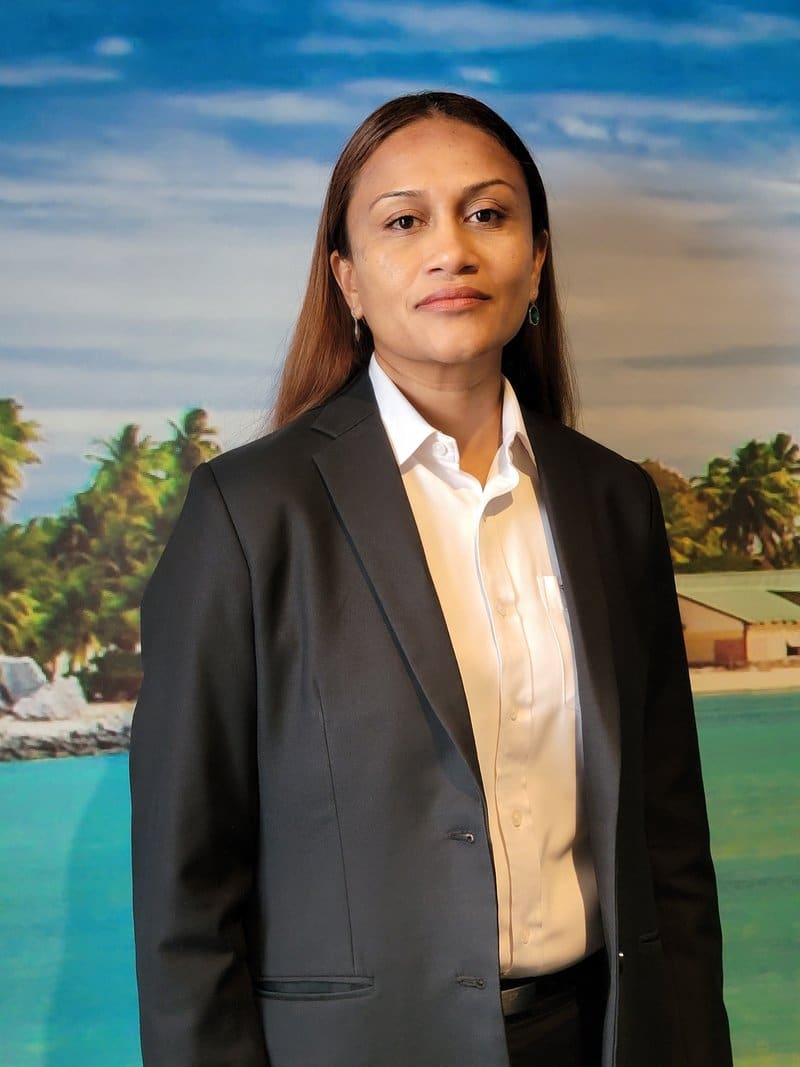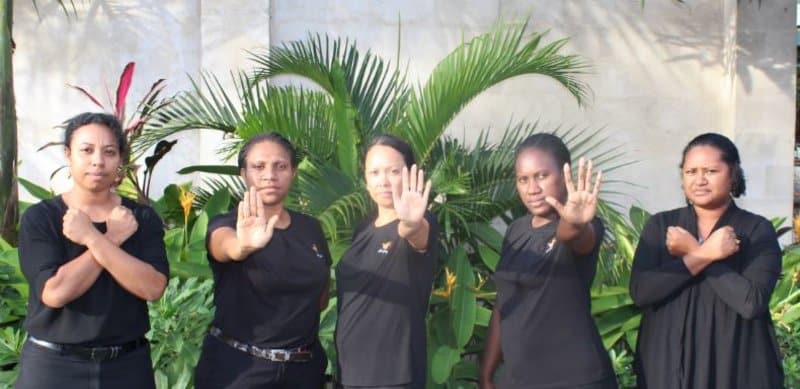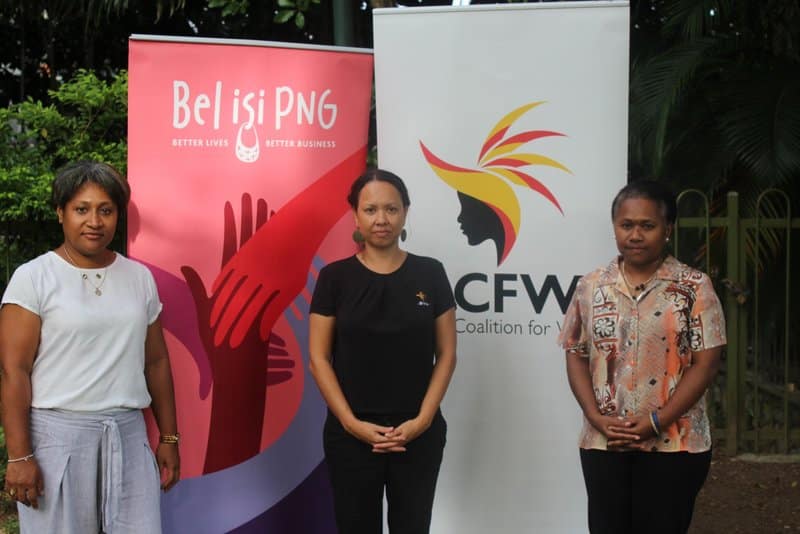
ICR Stories of Women Economic Empowerment
When Alicia Sahib moved from Fiji to Papua New Guinea and took on her new job as Head of Support Services at the Bank South Pacific Financial Group (BSP) in Port Moresby, she realised something was going wrong. “I started noticing that women were presenting themselves at work with visible injuries from physical assault,” she recounts. Then, a woman was dismissed because she did not show up at work for ten consecutive days. “It bothered me greatly that staff who were survivors of domestic violence may be at higher risk of losing employment due to absenteeism, have performance issues or resign.” This was the moment she decided to do something about it. She addressed the issue among BSP’s management in 2011. Soon after, a refurbishment of a safe house was funded to provide refuge for victims, and the company started to address domestic violence as a workplace issue.
In Papua New Guinea, gender-based violence is a pressing problem. While globally, one in three women experiences physical or sexual violence in her lifetime,[I] in Papua New Guinea more than two in three women are affected.[II] The acceptance of violence against women in society is high: around 70 percent of men as well as women believe it is justifiable for a man to hit his wife under certain circumstances.[III] This makes Papua New Guinea one of the most dangerous places worldwide to be a woman, regardless of income and education.[IV]
A business-to-business movement has evolved to prevent violence
The state has started to react to the problem. Back in 2013, the Papua New Guinean parliament passed a Family Protection Act which proscribes domestic violence[V] but has not yet been fully implemented, few perpetrators are brought to justice.[VI] The government has put in place some basic services for victims, though. Family and Sexual Violence Units (FSVUs) have been established as part of the police force and specialized Family Support Centers deal with victims in hospitals, [VII] even if funds are limited.[VIII]

“Before the Family Protection Act, a lot of people believed that domestic violence is a personal issue, but then everyone realized: it is a crime,” says Evonne Kennedy. She is the executive director of the Business Coalition for Women (BCFW), which has been tackling the issue by engaging the private sector in Papua New Guinea since 2014. Founded with the momentum of the new law and under the stewardship of the International Finance Corporation (IFC), the BCFW supports companies to establish policies against gender-based violence, enhance security for women at workplaces, raise awareness, and train staff to recognize problems and support victims.[IX]
”In the beginning, it was difficult to get business buy-in but research evidence helped propel the case and made them understand how violence is impacting their business and how it also presents a barrier to women’s progression into leadership positions.” says Evonne Kennedy. “Some prominent businesses stepped forward as role models and it soon evolved into a business-to-business movement.” Up to date, more than 65 businesses have joined the coalition, among them some of the largest mining companies in Papua New Guinea as well as small and medium enterprises. They all agree on the fact that gender-based violence can no longer be accepted and its prevention is a moral duty.
The right thing to do – and a smart one as well
BCFW also presented the private sector with a business case. Taking action on the issue, it argued, can result in financial benefits for companies while enhancing reputation, working environment and attractiveness for employees and investors alike.[X] So, it is not only the right thing to do, it is a smart one as well.
A recent study by the BFCW and the IFC has proven that gender-based violence in Papua New Guinea indeed imposes tangible costs on businesses due to absenteeism, reduced productivity as well as turnover of employees.[XI] More than half of the interviewed women reported that impacts like anxiety, depression, or shame due to violence prevent them from staying at work for a full day or attending at all. Others reported feeling drained of enthusiasm.[XII] The study, published in 2021 calculated that companies lose an average of 10 working days per year per employee due to gender-based violence, amounting to wages of approximately USD 2.1 million for the participating companies.[XIII]
A safe house turns into a widespread support programme
The Bank South Pacific, which has around 3,100 employees in Papua New Guinea, was one of the first companies to join the BCFW. In 2015, the CEO agreed to Alicia Sahib’s proposition to convert a property in Port Moresby into a safe house for BSP staff. Sahib knew the importance of such a space from her own experience. Over many years she had lived in an abusive relationship and had not felt safe at home. She had even considered committing suicide. “I grew up in a conservative society with conservative views on a woman’s role in the family and this drove a lot of my behaviour despite being a modern working woman,” she says. “It even led me to accept and tolerate bad behaviour and abuse, I thought I just had to live with it.” But she decided not to live with it any longer, tell her story, help other women, and fight to eliminate domestic violence.

The new BSP safe house soon evolved into a full-fledged support programme for victims of gender-based violence called Bel isi PNG – peaceful Papua New Guinea. Different companies got involved, brought together by the BCFW. BSP donated the building, it is now open to employees of all BCFW members and run by a local NGO called Femili PNG. Financial support came from the IFC and the Australian Department of Foreign Affairs and Trade. A case management centre was established as a first contact point for victims. Today, it assists around 150 victims every month, referring them to safe houses if needed or providing services like medication or counselling.
Creating a lasting change at the workplace and in society
Like other members of the BCFW, BSP launched an internal family & sexual violence policy in 2019. Alicia Sahib oversees its implementation. “We have trained voluntary staff members for victims to talk to, some approach them just to chat and when ready re-approach them to seek help,” she says. Recently, a full-time service manager has been hired to channel all internal cases and, if necessary, refer victims to the safe house and provide them with medical cover for injuries or security assistance . At the same time, BSP hopes to change the mind-set of employees and create a safe workplace environment through an awareness campaign. The BCFW supports this effort through regular in-house trainings. “It is like an ongoing education happening within the business community to create a lasting change,” says Evonne Kennedy. “We hope that some of that will spill over from the workplace into the community and create a ripple effect.”
BSP has already noticed positive outcomes of the new policy and campaigns. “Today, there is a lower acceptance of Family Sexual Violence among our staff, and a higher recognition of the impacts among employees and employee’s family and friends,” says Sahib. “And we have not recorded any violence-related loss of employment anymore either.” She regularly tells her own story at campaigning events and urges other women to not stay silent anymore.
Evonne Kennedy is certain that the business community has done its fair share to bring gender-based violence to the front of the public debate in Papua New Guinea. At the end of 2020, a parliamentary committee has been formed to deal with the topic. “That development is huge, because the government has actually committed a budget toward gender-based violence now,” she says. “We really need a national investment now that focusses not only on the capital Port Moresby but goes out to our provinces and into our communities through health centres, schools and so on.” In the meantime, the BCFW will carry on its advocacy work in the private sector, conduct trainings and safety audits, and engage more and more companies to make a case against gender-based violence.
Already now, the business coalition has demonstrated that fighting gender-based violence is an important part of a good business environment. It’s simple: Colleagues, who work in a benign and supportive environment, will feel safer, have better ideas and be more productive.
[I] HTTPS://WWW.UNWOMEN.ORG/EN/WHAT-WE-DO/ENDING-VIOLENCE-AGAINST-WOMEN/FACTS-AND-FIGURES
[II] Jewkes, R., Fulu, E., Roselli, T. and Garcia-Moreno, C. (2013) ‘Prevalence of and factors associated with non-partner rape perpetration: Findings from the UN Multi- country Cross-sectional Study on Men and Violence in Asia and the Pacific’. The Lancet Global Health, 1(4), e208-e218., via HTTPS://CDN.ODI.ORG/MEDIA/DOCUMENTS/9886.PDF
[III] HTTPS://DHSPROGRAM.COM/PUBS/PDF/FR364/FR364.PDF
[IV] HTTPS://WWW.HRW.ORG/WORLD-REPORT/2016/COUNTRY-CHAPTERS/PAPUA-NEW-GUINEA und IFC Studie, HTTPS://WWW.HRW.ORG/WORLD-REPORT/2016/COUNTRY-CHAPTERS/PAPUA-NEW-GUINEA
[V] HTTPS://PACIFICWOMEN.ORG/NEWS/FAMILY-PROTECTION-ORDERS-IMPORTANT-IN-DOMESTIC-AND-FAMILY-VIOLENCE-RESPONSE/
[VI] HTTPS://WWW.HRW.ORG/WORLD-REPORT/2016/COUNTRY-CHAPTERS/PAPUA-NEW-GUINEA
[VII] HTTPS://WWW.HRW.ORG/WORLD-REPORT/2016/COUNTRY-CHAPTERS/PAPUA-NEW-GUINEA
[VIII] Interview Evonne Kennedy, 20.06.22
[IX] PROMOTING WOMEN’S ORGANISATIONS INTO PUBLIC-PRIVATE DIALOGUES TO FOSTER WOMEN’S ECONOMIC EMPOWERMENT IN ACP COUNTRIES (ICR-FACILITY.EU)
[X] HTTPS://WWW.IFC.ORG/WPS/WCM/CONNECT/F1645167-7EFF-439B-922B-7656C75320AB/GPN_ADDRESSINGGBVH_JULY2020.PDF?MOD=AJPERES&CVID=NDDOKIS, S. 11
[XI] HTTPS://DEVPOLICY.ORG/ROLE-OF-PRIVATE-SECTOR-IN-ADDRESSING-FAMILY-AND-SEXUAL-VIOLENCE-20210929/?UTM_SOURCE=RSS&UTM_MEDIUM=RSS&UTM_CAMPAIGN=ROLE-OF-PRIVATE-SECTOR-IN-ADDRESSING-FAMILY-AND-SEXUAL-VIOLENCE-20210929, IFC Studie
[XII] IFC Studie, HTTPS://WWW.IFC.ORG/WPS/WCM/CONNECT/04D3B3D0-3D05-45BA-A042-3F626A3A197E/PNG-FSV-REPORT_FINAL.PDF?MOD=AJPERES&CVID=NHL.E5K
[XIII] IFC Studie, HTTPS://WWW.IFC.ORG/WPS/WCM/CONNECT/04D3B3D0-3D05-45BA-A042-3F626A3A197E/PNG-FSV-REPORT_FINAL.PDF?MOD=AJPERES&CVID=NHL.E5K
ICR Stories of Women Economic Empowerment
The ICR Stories of Women Economic Empowerment portray business environment reforms that are benefiting women. At the ICR Facility, we support organisations in Africa, Caribbean and Pacific (ACP) countries to improve their business environment, so that women can thrive as workers, entrepreneurs and investors. To promote the debate, inspire other organisations, and enable peer-to-peer learning, we retell good examples of reforms and initiatives that benefited women – even the ones where the ICR Facility was not involved.
The ICR Facility is funded by the European Union (EU) and the Organisation of African, Caribbean and Pacific States (OACPS) under the 11th European Development Fund (EDF), together with the German Federal Ministry for Economic Cooperation and Development (BMZ) and the British Council. The ICR Facility is implemented by GIZ, the British Council, Expertise France, and SNV.
